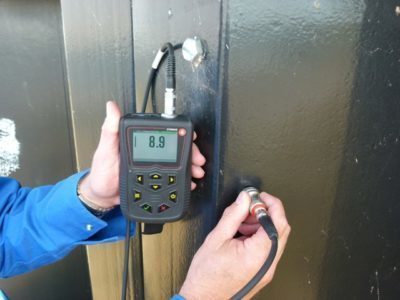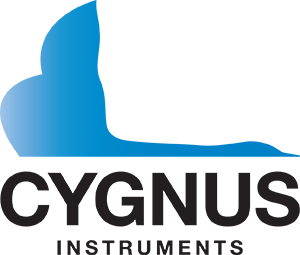Corrosion Thickness Gauge
Welcome to Cygnus Instruments, the pioneers of Multiple Echo technology and manufacturers of high-quality ultrasonic thickness gauges. With 40 years of innovation, we take pride in supplying gauges and probes recognized by marine surveyors and employed in almost every industrial application worldwide.
Our competitive prices and wide range of products make us the go-to choice for corrosion thickness gauges. Our corrosion thickness testers offer accurate and reliable measurements of material thickness, ensuring the integrity of structures. Equipped with automatic gain control and dual element probes, our gauges provide precise readings and enable calibration for various applications. To learn more, visit our website or give us a call at +1 346 223 0415.
How a Corrosion Thickness Gauge Works?

In a corrosion thickness gauge, a probe emits ultrasonic sound waves toward the material being tested. These sound waves travel through the material and are reflected back by the opposite surface or any internal defects, such as corrosion or delamination. By measuring the time taken for the sound waves to travel and return, the gauge calculates the thickness of the material.
There are different testing modes available in corrosion thickness testers: Single Echo, Echo to Echo, and Multiple Echo. The mode you utilize will determine the probe that’s required. In Single Echo mode, the gauge measures the time it takes for the sound wave to travel to the material’s back surface and back, providing a single thickness measurement.
Echo to Echo mode, on the other hand, measures the time taken for the sound wave to travel from the front surface to a thinner back wall surface and back to the probe, eliminating the coating or paint thickness. This mode is useful for measuring the remaining thickness of materials with coatings or paint layers.
The most advanced mode is Multiple Echo, which uses multiple back-wall echoes to measure the thickness. It is particularly effective in applications where coatings are present or in situations with extreme corrosion levels, as it eliminates the need to remove coatings.
By offering these different testing modes, corrosion thickness testers provide versatile and accurate measurements, helping industries assess material integrity and detect potential corrosion issues. To ensure you get the best readings, make sure to use the correct probe.
Applications of a Corrosion Thickness Gauge
A corrosion thickness gauge finds extensive applications across various industries for assessing material integrity and corrosion levels.
Here are some common applications:
- Marine and Offshore: In the maritime industry, corrosion thickness gauges are used to measure hull thickness, detect corrosion in ship structures, and ensure compliance with safety standards. They help prevent structural failures, ensure vessel safety, and optimize maintenance schedules.
- Oil and Gas: Corrosion is a significant concern in the oil and gas industry. These pipe thickness measuring instruments measure pipe and tank wall thickness and identify corrosion in pipelines, storage tanks, and pressure vessels. Regular inspections help prevent leaks, maintain pipeline integrity, and ensure the safety of oil and gas infrastructure.
- Power Generation: Corrosion can affect power plants and lead to costly downtime. Thickness gauges are employed to monitor the thickness of boiler tubes, pipes, and other critical components. Detecting corrosion early can optimize maintenance and repair schedules, preventing unexpected failures.
- Manufacturing: Corrosion thickness gauges are crucial in quality control during manufacturing processes. They ensure the integrity of fabricated structures, assess the thickness of materials used in production, and detect any potential defects or corrosion issues.
- Infrastructure: Bridges, storage tanks, and other infrastructure assets are susceptible to corrosion. These gauges help monitor and manage corrosion levels, enabling timely maintenance and preventing structural failures.
By offering accurate and reliable measurements, corrosion thickness testers help industries mitigate risks, improve safety, and extend the lifespan of their assets.
Maintenance and Care Tips for Corrosion Thickness Gauge
Here are some key tips to keep your gauge in optimal condition:
- Regular Calibration: Calibrate your gauge periodically to maintain accuracy. Follow our guidelines for calibration frequency.
- Cleaning: Clean the probe and gauge surfaces after each use to remove any debris or contaminants that could affect measurements.
- Storage: Store the gauge and probe in a dry and dust-free environment when not in use. Protect it from extreme temperatures and humidity.
- Battery Maintenance: Monitor the battery level and replace or recharge as needed to avoid power interruptions during inspections.
- Inspection and Service: Periodically inspect the gauge and probe(s) for any signs of wear, damage, or malfunction. Schedule routine servicing to ensure optimal performance.
Remember, following our instructions and recommendations is crucial for maintaining your corrosion thickness gauge and probe’s performance and longevity. By implementing these maintenance tips, you can maximize the lifespan and accuracy of your gauge, ensuring reliable measurements for your corrosion monitoring needs.
Choosing the Right Corrosion Thickness Gauge for Your Needs
When choosing the right corrosion thickness detector, several factors come into play to ensure accurate and efficient measurements.
Select a corrosion thickness gauge with a suitable probe for your application, considering factors such as material type, surface condition, and access limitations. Look for a gauge that provides clear and reliable readings, displaying accurate measurements of material thickness and corrosion levels.
Opt for testers that utilize advanced ultrasonic technology, enabling precise and non-destructive measurements. Consider additional features like data storage, statistical analysis, and reporting capabilities to enhance your testing and reporting efficiency.
Look for testers with intuitive displays, easy-to-read screens, and efficient scan modes for quick and comprehensive inspections. Ensure that the gauge has echo functionality, allowing for accurate detection and measurement of material thickness, even with coatings or paint layers.
Invest in a Corrosion Thickness Gauge Today!
We at Cygnus Instruments are dedicated to providing high-quality ultrasonic thickness testers and corrosion measurement solutions. As pioneers of Multiple Echo technology, we have been innovating in this field for over 40 years.
Our products are trusted by marine surveyors and widely used across various industrial applications worldwide. Whether you need to measure corrosion thickness, material thickness or perform calibration, we have the expertise and range of products to meet your needs.
For any inquiries or to discuss your requirements, please feel free to reach out to us. You can contact us directly at +1 346 223 0415 or send us an email at sales@cygnus-instruments.com. Alternatively, you can also use our convenient contact form on our website to get in touch with us. We value your feedback and are committed to providing exceptional customer service.
Get in touch with us today, and let us assist you in finding the perfect ultrasonic thickness gauge solution for your application.


